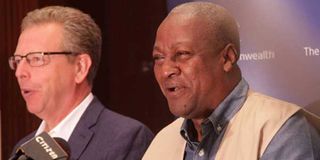Why the world has its eyes on Kenya’s General Election

Commonwealth Observer Group chairman John Dramani Mahama (right) with Commonwealth spokesman Martin Dawes in Nairobi last Thursday. PHOTO | FILE | NATION MEDIA GROUP
What you need to know:
- Tuesday's election has attracted the celebrities of international politics—all leading different poll observation bodies that have sent in about 8,000 international monitors.
- The media attention here is intense compared to Rwanda, which held elections on Friday.
- On the peace front, Kenya has contributed troops to UN Peacekeeping and is a viable influence in pushing for warring parties in neighbouring countries to talk.
Kenya’s strategic location on the continent, relative civil liberties and the changing geopolitics are the reason many international observers want to be a part of the General Election.
So far, Tuesday's election has attracted the celebrities of international politics—all leading different poll observation bodies that have sent in about 8,000 international monitors.
The leaders include former US Secretary of State John Kerry, former South African President Thabo Mbeki and his former Ghanaian counterpart John Mahama, as well as former Senegalese Prime Minister Aminata Toure.
And, as expected, that has attracted global media attention.
“Kenya’s presidential and local elections, scheduled for next Tuesday, are being closely watched in the region and beyond for good reason,” wrote the United Kingdom newspaper The Guardian on Friday. “The country is one of Africa’s most open societies, and an important commercial centre.”
DEMOCRACY
Added the Economist, the respected weekly newsmagazine: “Kenya’s democracy is one of the most vibrant and competitive in Africa.
But that comes at a price. Elections are bitterly fought and often violent.”
The media attention here is intense compared to Rwanda, which held elections on Friday.
“Rwanda is small, landlocked and survives because neighbours are stable,” observed Professor Macharia Munene, who teaches history and international relations at USIU-Africa, in an interview on Friday.
“Kenya, on the other hand, is strategic: If you want to go to East or Central Africa, you go through Kenya.
“People are interested in what is going on here. There are people who have invested their money here or multinationals headquartered here.”
INTERNATIONAL PLAYERS
With every change of government affecting foreign policies and domestic decisions, international players could be watching to see if any of the country’s thread of economic diplomacy could change after next week.
For example, Kenya, Nigeria, Egypt and South Africa have been pushing for the merger of the main trading blocs (in Eastern, Southern and West Africa) to create a “tripartite” trade agreement.
These blocs include the Economic Community of West African States (Ecowas), the Southern Africa Development Community (SADC), the East African Community (EAC) and the Common Market for Eastern and Central Africa (Comesa).
“Kenya is the main hub of all activities in eastern Africa and is only comparable to South Africa and Nigeria in the Southern and West Africa, respectively,” Mr George Mucee, the practice leader at Fragomen Kenya, an immigration consultancy firm in Nairobi, told the Nation.
“Africa is the growth frontier and Kenya is part of that. Peaceful elections would, therefore, mean that Kenya continues to assert itself as the economic hub not only in the region but also in Africa.”
STABILITY
The elections is seen as vital to continue the stability gained since the post-poll violence in 2008 and because of internal turmoil in Africa’s other big players.
Former Rangwe MP Shem Ochuodho, who is global chairman of the Kenya Diaspora Alliance, a federation of associations of Kenyans abroad, says South Africa’s own imminent elections and corruption allegations against President Jacob Zuma, Nigeria’s oil price woes and the ill-health of its President Muhammadu Buhari, and the fact that Egypt is recovering from the Arab Spring leave eastern Africa a better choice.
“It leaves East Africa as the option and Kenya as the main supply route to East and Central Africa because Tanzania has had stronger connections to Southern Africa, which is having its own troubles,” said Dr Ochuodho.
And with about three million people staying abroad in Europe and the US, he argues, this community creates an influence that indirectly affects events in Kenya and their countries of residence.
CONTRIBUTED TROOPS
On the peace front, Kenya has contributed troops to UN Peacekeeping and is a viable influence in pushing for warring parties in neighbouring countries to talk.
Ms Hawa Noor, a Horn of Africa researcher and analyst, cites Kenya’s role in peace efforts in Somalia and South Sudan.
“It is an important ally of the West in the fight against the so-called terrorism, both militarily and through soft approaches, namely, development projects that are coordinated mostly from Nairobi,” said Ms Noor, referring to the Kenya Defence Forces fight against al-Shabaab in Somalia.
Another explosion of violence is something Kenya’s international partners won’t like.
“Kenya is the role model that partly was or, to put it differently, it behaves like an overgrown baby,” Ms Noor put it bluntly in an interview on Friday.





